Arts
The claims of the Court
Ted Whitehead
Sizwe Bansi is Dead (Royal Court) The Point (Mermaid)
In 19701 submitted my first play, which had collected the usual pile of rejection slips, to a London literary agent, who replied: 'The play is certainly powerful and dramatic enough but it is unperformable in the present climate of British theatre.' So I sent it to the theatre which had made its reputation by performing the unperformable—the Royal Court. Within months the Court had produced it, transferred it to the West End and given me a post that enabled me to take up writing full time. Since then, naturally, I've felt a gut loyalty to the theatre rather like my feeling for Liverpool FC—individual teams and managers may come and go, but I'm a fan of the club.
However, during the last few years it has been depressing to watch the Royal Court sliding down the league: and now it seems they may be facing relegation to the history books. This is partly their own fault: during this period they seem to have lost any clear sense of policy, let alone mission. You would certainly never deduce from their programme that the theatre was dedicated to finding and encouraging new British playwrights.
But first let's dismiss a few myths. The Court has put on very little specifically 'left-wing' drama, dreary or otherwise. It has put on very few 'kitchen sink' plays (I haven't seen a sink on the stage for years, alas). And I don't think it has put on any plays that would be 'unperformable' elsewhere.
What it has done is to switch restlessly between allegiance to established Court writers, obeisance to fashionable names and assistance to developing playwrights, in a series of plays of wildly varying quality.. And all with one eye fixed fearfully on the box office. The fear has been justified, as audiences have become thinner and thinner. Last year the average audience was 36 per cent, although the Arts Council subsidy is based on audience expectation of 55 per cent. Hence the present crisis.
Just as important is the fact that none of their plays has transferred successfully to the West End. Yet over the Years the Royal Court has come to accept the revenue from West End transfers not as a bonus but as a necessity to offset their inevitable losses.
But how many good new serious plays do run in the West End nowadays? Since 1972, when the Court last had several profitable transfers, that market has frozen up, as the experience of the few brave and bold commercial impresarios, such as Michael Codron, Michael White, and Eddie Kulu
kundis would confirm. Apart from the odd star vehicle, the only plays in with a chance of making money are escapist or conformist pieces.
It's not really surprising. The traditional West End audience has seen its values savaged for so long that it has become tired of challenge and wants reassurance, while any new or alternative audience simply finds the prices beyond its reach.
In these harsh circumstances I suspect that the Arts Council may have been getting the Royal Court on the cheap. It has been argued that some smaller experimental theatres. and groups have produced better work, for much less subsidy. But this is tendentious: many of these outfits are committed to touring, or to community work, or to specific issues like feminism, or new techniques like improvisation—they are often, in any. case, decidedly anti-literary. Not one can match the Court's achievement in developing new writers.
Of course one can reject the whole idea of subsidising the arts, and let theatre, opera, ballet and music go hang; but if we are to have subsidy, and if we do care about new British drama, then surely the claims of the Royal Court should be compared not with those of the small groups but with those of the RSC and the National Theatre, which receive vastly greater amounts. Theatres all round the world have fed off the work emanating from Sloane Square, and would be astounded if the Royal Court were to
close. Times are tough, but I don't think we can afford to let that happen.
Meanwhile the Court is offering another revival of Sizwe Bans! is Dead, the play developed by the director, Athol Fugard, and the two actors, John Kani and Winston Nshona, a moving and very funny piece which says more than any tract ever could about what it is like to be black in South Africa, a society in which the majority are treated as the aliens.
At the Mermaid is Harry Nilsson's The Point, another study of what it is to be different—in this case, lo have a round head when all about you have pointed ones. The hero, Oblio (Wayne Sleep), sings and dances his way through a series of adventures in the Pointless Forest (some excellent scenic effects here) and finally achieves a pointed cranium, only to discover that all the others have now turned to round heads —but also to discover that it doesn't matter. It's nonsense, but it has some dazzling costumes and pleasant tunes and should appeal to children of all ages up to twelve.


































 Previous page
Previous page